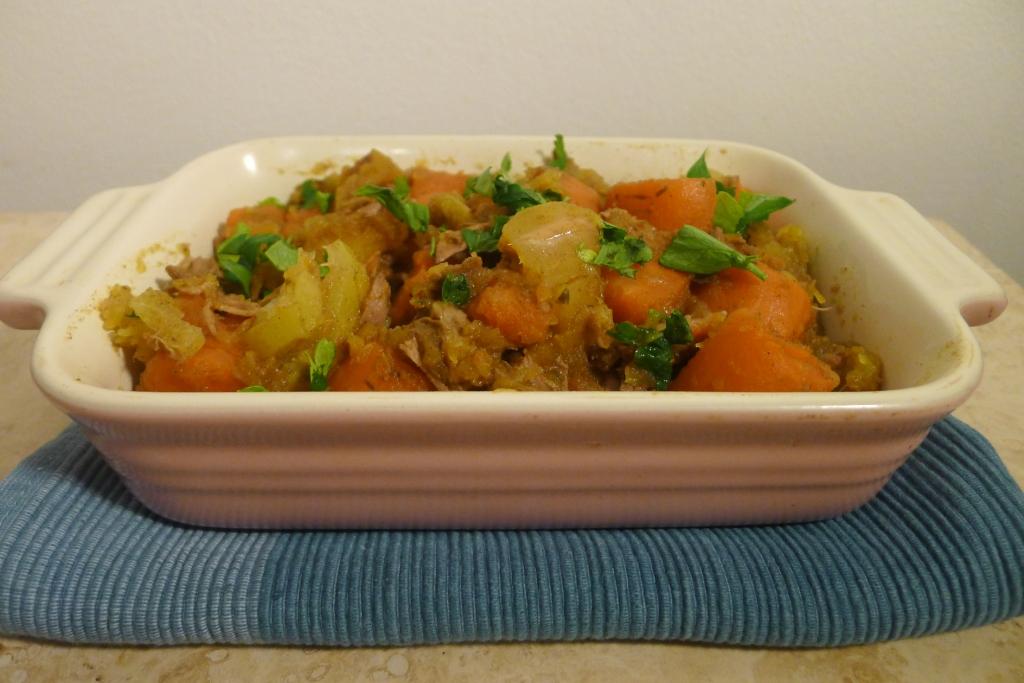Ceri’s story
I started eating paleo around 3 years ago through a desire to find balance in my eating (was sick of trying different diets) and to generally support my health.
I have suffered from IBS for a good few years (pre and post paleo), and in that time have discovered a few key aggravators for me such as marathon running training (easy to cut down on), too much coffee (not so easy), too many nuts, large quantities of dairy or legumes and the odd chocolate & sugar overdose (mindless comfort eating, usually).
I’m definitely a work in progress!
While eating clean Paleo does make a huge difference to my symptoms. I’ve discovered, the hard way, that stress is probably the biggest trigger for me.
Sadly I lost my mother to cancer in 2012, and distinctly remember a severe bad patch of IBS in the weeks that followed her passing – so much so that I visited the doctor (unsurprisingly he wasn’t helpful).
A few months later I decided to work with a nutritionist and got a stool test done which revealed I had SIBO (small intestinal bacterial overgrowth – often misdiagnosed as candida).
It could have been the stress that caused this, but it also could have been other factors such as a knock on effect from my previous diet (I was overweight in my early 20s), or use of antibiotics for example.
Earlier this year I tried a low-FODMAP version of the Paleo diet for 4 months to help with my SIBO symptoms.
I initially panicked as low-FODMAP diets suggest, at first, the removal of all spices and aromatics such as onions and garlic.
Creativity vs. deprivation
I decided to get creative and focused on getting flavor from ingredients such as buttery ghee, salty anchovies and zingy citrus zest, and adding chives at the end of cooking to replace onion & garlic.
The recipe below uses a preserved lemon stirred in at the end for an exquisite tang. Preserved lemons can be found in specialty stores or you can make your own by stuffing lemons with salt, and packing them into a jar with water where they will slowly ferment over a month.
Using a slow cooker is a great, no-fuss way of cooking up batches of food. Slow cooked stews tenderize meat superbly making it easier to digest, especially when cooked in nourishing homemade stock.
The mistake most people make when using a slow cooker is adding too much liquid – it won’t evaporate the same way as if stove cooked, so you’ll need to use far less if adapting a recipe.
If your stew is still too runny you can always transfer the sauce element to the stove top and reduce before pouring back over the meat and vegetables to serve. I like my stews hearty and thick!
Lessons learned
Before you endlessly worry about eating the right foods, my advice for anyone dealing with stress-related IBS is to work on the stress element first and foremost. Not necessarily removing the stressor, since that often isn’t possible, but adapting the way you deal with stress.
Yoga, massage, light exercise, and fun times with friends and family has really helped me.
Slow Cooker Lamb & Preserved Lemon Stew (Serves 3-4)
Ingredients
- 1.25 lb lamb (stewing cut such as neck), diced
- ½ Tbs apple cider vinegar
- 2 bay leaves
- 1 Tbs cinnamon
- 1 lb carrots, large dice
- ½ large butternut squash, large dice
- 2/3 cup fresh stock (ideally lamb or beef or vegetable)
- 1 preserved lemon, diced
- Handful fresh parsley
- 1 Tbs chives, finely diced
Instructions
- Heat a large skillet and fry the meat until it browns on all sides. This helps with the flavor of the stew (browning meat is called the Maillard reaction!). Transfer lamb to slow cooker and deglaze the skillet with ½ Tbs of apple cider vinegar. Pour this juice back over the lamb.
- Now add the chives, bay leaves, cinnamon, carrots and squash to the slow cooker and pour over the stock. Cook on low for 8 hours.
- When ready to serve stir through the preserved lemon and top with fresh parsley and chives
 Natural Kitchen Adventures, written by 30-something Londoner Ceri Jones is a recipe blog and resource following Ceri’s adventures in the kitchen as she explores a world of eating natural, mostly Paleo & always gluten free foods. Her original yet incredibly simple recipes reflect her interest in naturopathic nutrition (using foods holistically as medicine) and a desire to get everyone to just simply eat and feel better. Ceri is currently on a career & foodie sabbatical exploring the delights of Northern California.
Natural Kitchen Adventures, written by 30-something Londoner Ceri Jones is a recipe blog and resource following Ceri’s adventures in the kitchen as she explores a world of eating natural, mostly Paleo & always gluten free foods. Her original yet incredibly simple recipes reflect her interest in naturopathic nutrition (using foods holistically as medicine) and a desire to get everyone to just simply eat and feel better. Ceri is currently on a career & foodie sabbatical exploring the delights of Northern California.



